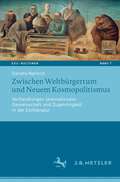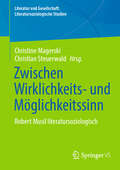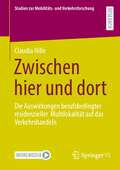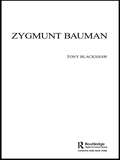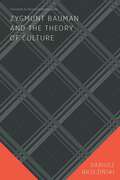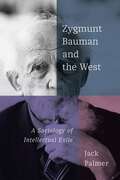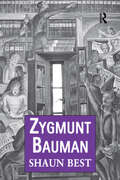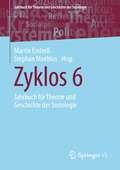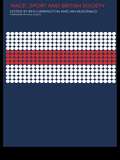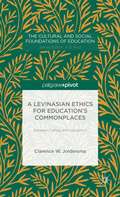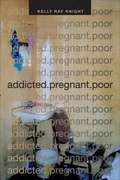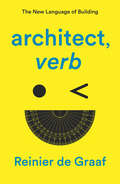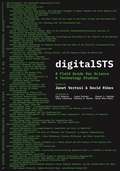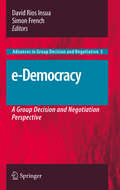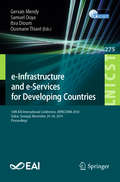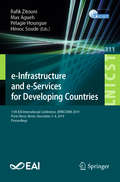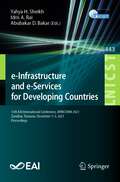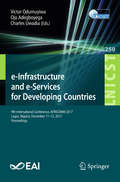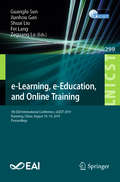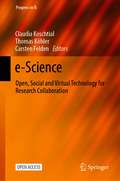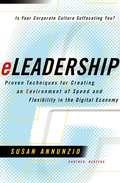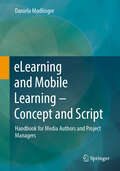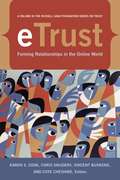- Table View
- List View
Zwischen Weltbürgertum und Neuem Kosmopolitismus: Verhandlungen übernationaler Gemeinschaft und Zugehörigkeit in der Exilliteratur (Exil-Kulturen #7)
by Sandra NarlochUnter dem Schlagwort eines ,Neuen Kosmopolitismus’ plädieren Theoretiker*innen verschiedener Disziplinen seit Beginn des 21. Jahrhunderts für eine kritische Wiederaufnahme und Aktualisierung des Kosmopolitismusbegriffs. Obwohl in diesem Kontext wiederholt die wesentliche Bedeutung betont wurde, die dem Exil in Bezug auf die Ausbildung kosmopolitischer Praktiken und Haltungen zukommt, sind die im deutschsprachigen Exil der Jahre 1933 bis 1945 entstandenen Texte bisher noch nicht umfassender in Beziehung zu neokosmopolitischen Positionen gesetzt worden. Hier setzt die Studie mit einer Relektüre von Werken von Irmgard Keun, Joseph Roth, Peter Weiss, Stefan Zweig, Lion Feuchtwanger und Thomas Mann an. Darüber hinaus bearbeitet sie mit ihrer Konzentration auf den Bereich der Exilliteratur auch insofern ein innovatives Forschungsfeld, als dezidiert literaturwissenschaftliche Perspektiven in den Debatten eines ,Neuen Kosmopolitismus’ bisher stark unterrepräsentiert sind.
Zwischen Wirklichkeits- und Möglichkeitssinn: Robert Musil literatursoziologisch betrachtet (Literatur und Gesellschaft. Literatursoziologische Studien)
by Christine Magerski Christian Steuerwald„In der modernen Gesellschaft“, so Peter L. Berger 1988, „leben noch immer einige Menschen, die eine ältere Lebensform, eine traditionale ‚Ganzheit‘ repräsentieren. Vielleicht sind sie glücklich, und vielleicht sollten wir sie beneiden. Aber für diejenigen, die aus der Quelle des modernen Relativismus getrunken haben, scheint es kein Zurück mehr zu geben.“ Was klingt wie eine Passage aus den Romanen Michel Houellebecqs, bezieht sich auf Robert Musils Roman Der Mann ohne Eigenschaften. Musil, mit dem sich der Wissenssoziologe Berger wiederholt beschäftigte, hatte nicht nur reichlich aus der Quelle des modernen Relativismus getrunken, sondern war angesichts von Krieg und Staatszerfall auch in einem Maße desillusioniert, das zur tiefgreifenden Reflexion der zeitgenössischen Verhältnisse und zum Versuch einer Klärung der Relation von Wirklichkeit und Möglichkeit drängte. Von diesem Versuch nimmt der vorliegenden Band seinen Ausgang. Mit Austin Harrington wird in Musil “an exemplary kind of social theorist“ gesehen und nach dem Potential seiner Schriften für ein Verständnis des modernen Subjekts im Spannungsfeld von Realität und Projektion gefragt. Mit dem „Dichter der Möglichkeiten“ (Kurt Benesch) setzen sich namhafte Vertreter sowohl Literaturwissenschaft wie auch der „Soziologie als Möglichkeitswissenschaft“ (Helmut Klages) auseinander. In Einzelstudien werden die Darstellung von Gesellschaft in den Texten Musils, die Erschaffung der Texte und deren Wirkung untersucht.
Zwischen hier und dort: Die Auswirkungen berufsbedingter residenzieller Multilokalität auf das Verkehrshandeln (Studien zur Mobilitäts- und Verkehrsforschung)
by Claudia HilleClaudia Hille untersucht in dem vorliegenden Buch die Auswirkungen berufsbedingter, residenzieller Multilokalität auf das Verkehrshandeln. Zu diesem Zweck analysiert sie im Rahmen einer qualitativen empirischen Erhebung individuelle Mobilitätsentscheidungen und Aktionsräume multilokal Wohnender. Kern der Analyse ist die Identifikation von Bewältigungsstrategien für die Wege zwischen den verschiedenen Lebensorten der Multilokalen. Ausgangspunkt dieser Analyse ist die Überlegung, dass multilokal Wohnende mit hohen Mobilitätsanforderungen konfrontiert sind und daher Routinen zur Mobilitätsbewältigung entwickeln. Zudem wird im Rahmen der Arbeit aufgezeigt, ob multilokal Wohnende über spezifische Mobilitätskompetenzen verfügen, die ihnen bei der Bewältigung der an sie gestellten Mobilitätsanforderungen helfen. Abschließend wird anhand einer Typologie die Wahrnehmung des Pendelns durch die multilokal Wohnenden diskutiert.
Zygmunt Bauman (Key Sociologists)
by Tony BlackshawThis timely book provides the definitive concise introduction to the phenomenon of Zygmunt Bauman. After introducing the man, his major influences and his special way of 'thinking sociologically', author Blackshaw traces the development of Bauman's project by identifying and explaining the major shifts of emphasis in his work – the break with Marxism and the postmodern 'turn', and the subsequent refocusing on 'liquid' modernity – as well as offering a clear and accessible guide to the key conceptual hinges which move the reader on. This book, the only concise introduction to Bauman's work on the market, goes on to explain the importance of the full range of persistent themes concerning Bauman, dealing specifically with individualization, freedom, identity, community, social control, consumption and waste, building a penetrating understanding of why these issues matter for this Key Sociologist. Bauman's ideas have impacted beyond sociology into criminology, political theory, cultural studies, leisure studies and so forth, and have also now penetrated outside the walls of the academy into social policy, welfare reform, social work and politics. Making use of pedagogical features such as boxed sections, chapter summaries, an annotated bibliography and links to further reading, this well-written text assumes no prior familiarity with Bauman's work and will appeal to anyone in any of these fields wishing to get acquainted with the ideas of one of the world's most wide-ranging thinkers.
Zygmunt Bauman and the Theory of Culture
by Dariusz BrzezińskiOne of the most influential intellectuals of the twentieth and twenty-first centuries, sociologist and philosopher Zygmunt Bauman (1925–2017) made reflection on culture a fundamental part of his academic work. He published a substantial number of papers on the topic, and many of his concepts would go on to significantly influence the social sciences and humanities. Bauman began his theoretical studies on culture when working at the University of Warsaw and continued them all his life. Inspired by the many intellectual currents he encountered over his more than six decades of work, Bauman wrote on culture in the contexts of such issues as Marxism and socialism, modernity and the Holocaust, postmodernity and liquid modernity, and contemporary nostalgia. In Zygmunt Bauman and the Theory of Culture Dariusz Brzeziński uses the evolution of Bauman’s theory of culture as a prism through which to offer a comparative analysis, putting Bauman’s work in conversation with the writings of other contemporary intellectuals.In this first comprehensive and critical assessment of Bauman’s lifelong work on culture, Brzeziński includes Bauman’s Polish-language papers and books, as well as his works discovered only posthumously, presenting them to an international audience.
Zygmunt Bauman and the West: A Sociology of Intellectual Exile
by Jack PalmerZygmunt Bauman was both an outsider of Western modernity and one of its foremost interpreters. He was an exemplary figure in twentieth-century intellectual work on exile who experienced both Nazi and Soviet forms of totalitarianism.The first work to draw extensively on Bauman’s personal archive, Zygmunt Bauman and the West argues that the distinctive social thought that sprang from Bauman’s lived experiences of exile amounts to a sustained, sophisticated, and hitherto unappreciated problematization of Eurocentrism and the West. Through an overview of the intellectual’s thought and his contribution to sociology, Jack Palmer explores Bauman’s experience and interpretation of the West and seeks to understand his work in a broader context, outside of the Eurocentric environment from which it was born. Intervening in a resurgent sociology of intellectuals, Zygmunt Bauman and the West re-evaluates the place of the West in social and political thought.
Zygmunt Bauman: Why Good People do Bad Things (Public Intellectuals and the Sociology of Knowledge)
by Shaun BestIn this ground-breaking book, Shaun Best analyses the intellectual knowledge production of Zygmunt Bauman and his rise to academic stardom in the English speaking world by evaluating the relation between his biography, the contexts in which he found himself, and why his intellectual creativity is admired by so many people. Bauman has an interesting 'contested' biography and underwent a number of intellectual shifts from the early stages of his academic career as Marxist. Bauman moved on and for almost ten years he was associated with 'postmodernity' (from 1989-1997) but in 2000 he decided to distance himself from postmodernism and rebrand his approach to understanding the contemporary world as 'liquid modernity'. Best shows how Bauman developed his canonised status becoming an intellectual guru in the UK and in Australia despite being largely ignored by the academic community in the United States and Central Europe. Rather than investigating Bauman's academic output as a demonstration of his 'creative genius', Best argues that most academic output involves the interplay of multiple factors and this book evaluates the influences on both intellectual choices and the social factors or contexts that led Bauman to attach himself to different sets of ideas during his academic career.
Zyklos 6: Jahrbuch für Theorie und Geschichte der Soziologie (Jahrbuch für Theorie und Geschichte der Soziologie)
by Stephan Moebius Martin EndreßDas Jahrbuch für Theorie und Geschichte der Soziologie trägt dem Umstand Rechnung, dass die Soziologie eine Wissenschaft ist, die es mit einem sich historisch wandelnden Gegenstand zu tun hat, also eine Wissenschaft ist, die sich stets von Neuem selbst reflektieren muss, und widmet sich der engen Verbindung von soziologischer Theorie- und Disziplingeschichte sowie allgemein der Reflexionsgeschichte der Gesellschaft und ihren verschiedenen Selbstbeschreibungen. Neben Aufsätzen zur Theorie und Geschichte der Soziologie enthalten die einzelnen Bände dieses Jahrbuches auch Nachrichten aus der soziologiegeschichtlichen Forschung, Inedita aus den verschiedenen einschlägigen Archiven, Interviews mit Zeitzeugen sowie Besprechungen einschlägiger Buchpublikationen zu diesem Thema.
Zyklos 7: Jahrbuch für Theorie und Geschichte der Soziologie (Jahrbuch für Theorie und Geschichte der Soziologie)
by Stephan Moebius Martin EndreßDas Jahrbuch für Theorie und Geschichte der Soziologie trägt dem Umstand Rechnung, dass die Soziologie es mit einem sich historisch wandelnden Gegenstand zu tun hat; sie also eine Wissenschaft ist, die sich stets von Neuem selbst reflektieren muss. Entsprechend widmet Zyklos sich der engen Verbindung von soziologischer Theorie- und Disziplingeschichte sowie allgemein der Reflexionsgeschichte von Vergesellschaftungen und ihren verschiedenen Selbstbeschreibungen. Neben Aufsätzen zur Theorie und Geschichte der Soziologie enthalten die einzelnen Bände dieses Jahrbuches auch Nachrichten aus der soziologiegeschichtlichen Forschung, Inedita aus den verschiedenen einschlägigen Archiven, Interviews mit Zeitzeugen sowie Besprechungen einschlägiger Buchpublikationen zu diesem Thema.
`Race', Sport and British Society
by Ben Carrington Ian McDonaldContrary to the popular belief that sport is an arena largely free from the corrosive effects of racism, this book argues that racism is evident throughout British sport. From playing fields and boardrooms of sports organisations, to the offices of sports policy makers and the media, this book breaks new ground in showing how discourses of 'race' and nation continue to pervade our sporting life.Looking at a range of sports, including football, rugby league and cricket, this book covers key topics such as:* British nationalism and nationalist ideology* racial science and the images of Asian and black physicality* sport, racism and the law* black feminism and the issues of race, gender and sport* the role of the media in perpetuating and challenging racial stereotypes.Challenging the prevailing liberal view that sport is one area of society where 'good race-relations' are developed, this book offers a wealth of research material, and a strong theoretical perspective on contemporary British sport. It will therefore be of vital interest to sociologists, sports studies students, sport policy-makers and anyone with an interest in contemporary British sport.
a levinasian ethics for education’s commonplaces: between calling and inspiration
by Nick To JohnJoldersma applies Levinas's ethics systematically to the commonplaces of education - teaching, learning, curriculum, and institutions - and elucidates the role of justice and responsibility and the meaning of calling and inspiration in education.
addicted.pregnant.poor
by Kelly Ray KnightFor the addicted, pregnant, and poor women living in daily-rent hotels in San Francisco's Mission district, life is marked by battles against drug cravings, housing debt, and potential violence. In this stunning ethnography Kelly Ray Knight presents these women in all their complex humanity and asks what kinds of futures are possible for them given their seemingly hopeless situation. During her four years of fieldwork Knight documented women's struggles as they traveled from the street to the clinic, jail, and family court, and back to the hotels. She approaches addicted pregnancy as an everyday phenomenon in these women's lives and describes how they must navigate the tension between pregnancy's demands to stay clean and the pull of addiction and poverty toward drug use and sex work. By creating the space for addicted women's own narratives and examining addicted pregnancy from medical, policy, and social science perspectives, Knight forces us to confront and reconsider the ways we think about addiction, trauma, health, criminality, and responsibility.
architect, verb.: The New Language of Building
by Reinier de GraafThe Hidden Rules of Architecture: how to build world-class, award winning, creative, innovative, sustainable, liveable and beautiful spaces that foster a sense of place and well beingLeading architect Reinier de Graaf De Graaf punctures the myths behind the debates on what contemporary architecture is, with wit and devastating honesty. Architecture, it seems, has become too important to leave to architects. No longer does it suffice to judge a building solely by its appearance, it must be measured, and certified. When architects talk about &“Excellence,&” &“Sustainability,&” &“Well-being,&” &“Liveability,&” &“Placemaking,&” &“Creativity,&” &“Beauty&” and &“Innovation&” what do they actually mean? In architect, verb. De Graff dryly skewers the doublespeak and hot air of an industry in search of an identity in the 21st century. Who determines how to measure a &“green building&”? Why is Vancouver more &“liveable&” than Vienna? How do developers get away with advertising their buildings as promoting &“well-being&”? Why did Silicon Valley become so obsessed with devising &“creative&” spaces or developing code that replaces architects? How much revenue can be attributed to the design of public space? Who gets to decide what these measurements should be, and what do they actually mean? And what does it mean for the future of our homes, cities, planet? He also includes a biting, satirical dictionary of &“profspeak&”: the corporate language of consultants, developers and planners from &“Active listening&” to &“Zoom Readiness.&”
digitalSTS: A Field Guide for Science & Technology Studies
by Janet Vertesi David RibesScholars across the humanities, social sciences, and information sciences are grappling with how best to study virtual environments, use computational tools in their research, and engage audiences with their results. Classic work in science and technology studies (STS) has played a central role in how these fields analyze digital technologies, but many of its key examples do not speak to today’s computational realities. This groundbreaking collection brings together a world-class group of contributors to refresh the canon for contemporary digital scholarship.In twenty-five pioneering and incisive essays, this unique digital field guide offers innovative new approaches to digital scholarship, the design of digital tools and objects, and the deployment of critically grounded technologies for analysis and discovery. Contributors cover a broad range of topics, including software development, hackathons, digitized objects, diversity in the tech sector, and distributed scientific collaborations. They discuss methodological considerations of social networks and data analysis, design projects that can translate STS concepts into durable scientific work, and much more.Featuring a concise introduction by Janet Vertesi and David Ribes and accompanied by an interactive microsite, this book provides new perspectives on digital scholarship that will shape the agenda for tomorrow’s generation of STS researchers and practitioners.
e-Democracy
by David Rios Insua Simon FrenchInternet is starting to permeate politics much as it has previously revolutionised education, business or the arts. Thus, there is a growing interest in areas of e-government and, more recently, e-democracy. However, most attempts in this field have just envisioned standard political approaches facilitated by technology, like e-voting or e-debating. Alternatively, we could devise a more transforming strategy based on deploying web based group decision support tools and promote their use for public policy decision making. This book delineates how this approach could be implemented. It addresses foundations, basic methodologies, potential implementation and applications, together with a thorough discussion of the many challenging issues. This innovative text will be of interest to students, researchers and practitioners in the fields of e-government, e-democracy and e-participation and research in decision analysis, negotiation analysis and group decision support.
e-Infrastructure and e-Services for Developing Countries: 10th EAI International Conference, AFRICOMM 2018, Dakar, Senegal, November 29-30, 2019, Proceedings (Lecture Notes of the Institute for Computer Sciences, Social Informatics and Telecommunications Engineering #275)
by Gervais Mendy Samuel Ouya Ibra Dioum Ousmane ThiaréThis book constitutes the thoroughly refereed proceedings of the 10th EAI International Conference on e-Infrastructure and e-Services for Developing Countries, AFRICOMM 2018, held in Dakar, Senegal, in November 2018. The 28 full papers were carefully selected from 49 submissions. The accepted papers provide a wide range of research topics including e-health, environment, cloud, VPN and overlays, networks, services, e-Learning, agriculture, IoT, social media, mobile communication and security.
e-Infrastructure and e-Services for Developing Countries: 11th EAI International Conference, AFRICOMM 2019, Porto-Novo, Benin, December 3–4, 2019, Proceedings (Lecture Notes of the Institute for Computer Sciences, Social Informatics and Telecommunications Engineering #311)
by Max Agueh Rafik Zitouni Pélagie Houngue Hénoc SoudeThis book constitutes the thoroughly refereed proceedings of the 11th International Conference on e-Infrastructure and e-Services for Developing Countries, AFRICOMM 2019, held in Porto-Novo, Benin, in December 2019. The 19 full papers were carefully selected from 46 submissions. The accepted papers provide a wide range of research topics including targeted infrastructures, Internet of Things (IoT), wireless and mobile networks, intelligent transportation systems (ITS), software and network security, cloud and virtualization, data analytics, and machine learning.
e-Infrastructure and e-Services for Developing Countries: 13th EAI International Conference, AFRICOMM 2021, Zanzibar, Tanzania, December 1-3, 2021, Proceedings (Lecture Notes of the Institute for Computer Sciences, Social Informatics and Telecommunications Engineering #443)
by Yahya H. Sheikh Idris A. Rai Abubakar D. BakarThis book constitutes the thoroughly refereed proceedings of the 13th International Conference on e-Infrastructure and e-Services for Developing Countries, AFRICOMM 2021, held in Zanzibar, Tanzania, in December 2021. The 31 full papers presented were carefully selected from 78 submissions. The papers discuss issues and trends, resent research, innovation and experiences related to e-Infrastructure and e-Services along with their associated policy and regulations with a deep focus on developing countries. In recognition of the challenges imposed by the COVID-19 pandemic, the conference organized a workshop to share experience on digital leaning and teaching at the time of pandemic, which garnered 3 papers.
e-Infrastructure and e-Services for Developing Countries: 9th International Conference, Africomm 2017, Lagos, Nigeria, December 11-12, 2017, Proceedings (Lecture Notes of the Institute for Computer Sciences, Social Informatics and Telecommunications Engineering #250)
by Victor Odumuyiwa Ojo Adegboyega Charles UwadiaThis book constitutes the thoroughly refereed proceedings of the 9th International Conference on e-Infrastructure and e-Services for Developing Countries, AFRICOMM 2017, held in Lagos, Nigeria, in December 2017. The 19 full papers, 12 short papers and 5 workshop papers were carefully selected from 81 submissions. The papers were presented in eight sessions: e-government, network and load management, digital inclusion, knowledge extraction, representation and sharing, networks and communications, ICT applications for development, decision support, e-business and e-services, internet measurement.
e-Learning, e-Education, and Online Training: 5th EAI International Conference, eLEOT 2019, Kunming, China, August 18–19, 2019, Proceedings (Lecture Notes of the Institute for Computer Sciences, Social Informatics and Telecommunications Engineering #299)
by Guanglu Sun Zeguang Lu Shuai Liu Jianhou Gan Fei LangThis book constitutes the proceedings of the 5th International Conference on e-Learning, e-Education, and Online Training, eLEOT 2019, held in Kunming, China, in August 2019. The 46 revised full papers presented were carefully reviewed and selected from 99 submissions. They focus on most recent and innovative trends in this broad area, ranging from distance education to collaborative learning, from interactive learning environments to the modelling of STEM (Science, Technology, Mathematics, Engineering) curricula.
e-Science: Open, Social and Virtual Technology for Research Collaboration (Progress in IS)
by Thomas Köhler Claudia Koschtial Carsten FeldenThis open access book shows the breadth and various facets of e-Science, while also illustrating their shared core. Changes in scientific work are driven by the shift to grid-based worlds, the use of information and communication systems, and the existential infrastructure, which includes global collaboration. In this context, the book addresses emerging issues such as open access, collaboration and virtual communities and highlights the diverse range of developments associated with e-Science. As such, it will be of interest to researchers and scholars in the fields of information technology and knowledge management.
eLeadership: Proven Techniques for Creating an Environment of Speed and Flexibility in the Digital Economy
by Susan AnnunzioProven Techniques for Creating an Environment of Speed and Flexibility in the Digital Economy
eLearning and Mobile Learning - Concept and Script: Handbook for Media Authors and Project Managers
by Daniela ModlingerThis practical handbook provides a well-founded insight into the complex preparatory work for the realisation of eLearning projects. The book describes how project managers and media authors work as a team to create a script for eLearning that fulfils learning psychology criteria and current multimedia didactics. Tools for designing and writing scripts are presented and evaluated so that a needs-based selection is possible. The third edition has been revised and updated throughout. A new chapter on "Mobile Learning" shows the latest developments. The draft of instructional videos and the possibilities of the social web are explained in detail. Enriched with valuable tips for work organisation and an outline of the media author's job description, the handbook is aimed at project managers and specialists in companies, further education institutions and multimedia agencies as well as media authors and those who want to become one. Numerous checklists facilitate daily work, e.g. for checking a finished script - a quality assurance measure that helps save time and money. Written directly for everyday professional use, the book uses practical methods and work aids as well as tips and tricks to show how a strong draft and a carefully prepared script make a decisive contribution to the successful production of eLearning applications.
eTrust: Forming Relationships in the Online World
by Karen S. Cook Chris Snijders Coye Cheshire Vincent BuskensThere is one thing that moves online consumers to click “add to cart,” that allows sellers to accept certain forms of online payment, and that makes online product reviews meaningful: trust. Without trust, online interactions can’t advance. But how is trust among strangers established on the Internet? What role does reputation play in the formation of online trust? In eTrust, editors Karen Cook, Chris Snijders, Vincent Buskens, and Coye Cheshire explore the unmapped territory where trust, reputation, and online relationships intersect, with major implications for online commerce and social networking. eTrust uses experimental studies and field research to examine how trust in anonymous online exchanges can create or diminish cooperation between people. The first part of the volume looks at how feedback affects online auctions using trust experiments. Gary Bolton and Axel Ockenfels find that the availability of feedback leads to more trust among one-time buyers, while Davide Barrera and Vincent Buskens demonstrate that, in investment transactions, the buyer’s own experience guides decision making about future transactions with sellers. The field studies in Part II of the book examine the degree to which reputation facilitates trust in online exchanges. Andreas Diekmann, Ben Jann, and David Wyder identify a “reputation premium” in mobile phone auctions, which not only drives future transactions between buyers and sellers but also payment modes and starting bids. Chris Snijders and Jeroen Weesie shift focus to the market for online programmers, where tough competition among programmers allows buyers to shop around. The book’s third section reveals how the quality and quantity of available information influences actual marketplace participants. Sonja Utz finds that even when unforeseen accidents hinder transactions—lost packages, computer crashes—the seller is still less likely to overcome repercussions from the negative feedback of dissatisfied buyers. So much of our lives are becoming enmeshed with the Internet, where ordinary social cues and reputational networks that support trust in the real world simply don’t apply. eTrust breaks new ground by articulating the conditions under which trust can evolve and grow online, providing both theoretical and practical insights for anyone interested in how online relationships influence our decisions. A Volume in the Russell Sage Foundation Series on Trust
growing up GLOBAL: THE CHANGING TRANSITIONS TO ADULTHOOD IN DEVELOPING COUNTRIES
by National Research Council Institute of Medicine of the National AcademiesThe challenges for young people making the transition to adulthood are greater today than ever before. Globalization, with its power to reach across national boundaries and into the smallest communities, carries with it the transformative power of new markets and new technology. At the same time, globalization brings with it new ideas and lifestyles that can conflict with traditional norms and values. And while the economic benefits are potentially enormous, the actual course of globalization has not been without its critics who charge that, to date, the gains have been very unevenly distributed, generating a new set of problems associated with rising inequality and social polarization. Regardless of how the globalization debate is resolved, it is clear that as broad global forces transform the world in which the next generation will live and work, the choices that today's young people make or others make on their behalf will facilitate or constrain their success as adults. Traditional expectations regarding future employment prospects and life experiences are no longer valid. Growing Up Global examines how the transition to adulthood is changing in developing countries, and what the implications of these changes might be for those responsible for designing youth policies and programs, in particular, those affecting adolescent reproductive health. The report sets forth a framework that identifies criteria for successful transitions in the context of contemporary global changes for five key adult roles: adult worker, citizen and community participant, spouse, parent, and household manager.
